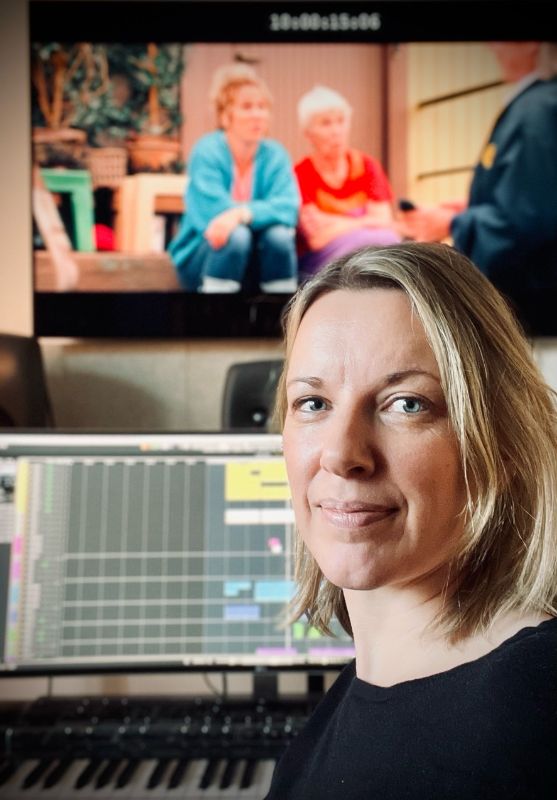Recordist, sound designer
"As a recordist, you need cooperation and rapid problem-solving skills. Working with actors also requires a sensitive approach, as the button microphone has to be hidden under their clothes. In sound design, creativity is a real asset. Technical skills speed up the work, but most of it relies on your ears and heart."

- Minna Hellman
- Works as a freelance recordist and sound designer.
- Graduated from Tampere University of Applied Sciences as Bachelor of Media.
- 18 years of work experience in the field.
Briefly explain what you do for a living.
I work as a recordist and sound designer mainly in the production of films and TV series. As a recordist, I make sure that the speech and action sounds of the performers at the scene are recorded as well as possible. As a sound designer, I mix and add the required sounds to the finished recording in the post-production stage.
How have you ended up in the profession of your choice?
I have a musical background, which led me to work with pictures and sound half by accident.
Describe your typical working day or week.
I start my workday by setting up the equipment at the scene. Then I mic up the actors, so I hide small microphones and transmitters in their clothes. The scenes of the day are filmed according to a previously planned schedule. First, the scene is rehearsed. That's when I make sure that the microphones on both the actors and the boom operator work so that everything goes as planned during the actual take. There are many moving parts in a scene, so it may take multiple takes to make everyone happy. About halfway through the day, we have a 30-to-60-minute lunch break depending on the production. At the end of the day, we pack the equipment in the car or in a designated place to wait for the next day.
When I work as a sound designer, I spend the whole day in a studio editing dialogue, effects, background sounds or ambience, and putting music in place. Actors may also be recorded after the scenes are shot, and we usually reserve a few days for it in post-production.
What kind of work environment or working hours do you have?
As a recordist, I work at the scenes. Sometimes they are filmed in an indoor studio, sometimes at the top of a fell or in a mine underground. Conditions and locations vary from side to side. The workdays can be long and take place at any time. If the story has outdoor scenes that take place at night, they will also be shot at night or when it's dark. On average, my working days vary between 8 and 10 hours, and 12 hours is the limit. It depends whether we are filming in four or five days a week.
Sound design is clean indoor work that is done in a proper studio. There are different stages in post-audio production, and I mainly work between 9.00 and 17.00.
What kind of competence or qualities are required in the profession?
As a recordist, you need cooperation and rapid problem-solving skills. Working with actors also requires a sensitive approach, as the button microphone has to be hidden under their clothes.
In sound design, creativity is a real asset. Technical skills speed up the work, but most of it relies on your ears and heart.
What is the best thing about your profession?
Fun colleagues are the best part of the work, and the fact that I can make use of my creativity.
What are the downsides of the profession or what seems challenging?
The filming schedules are usually tight. The working atmosphere can sometimes have its challenges, but nowadays they are addressed at a relatively low threshold. The work can also be unevenly distributed throughout the year with summers being the busiest and winters a bit quieter.
What would you tell a person considering the profession of a recordist or sound designer?
Networking is important in the field, and it's worth investing in it already during your studies. The profession requires strong technical expertise, but it is above all human-oriented work. You must get along with different kinds of people, as arts attract a lot of large personalities.
How do you see the future of your profession?
Recordists and sound designers will also be needed in the future. Technology development and artificial intelligence will make some work stages easier, but I doubt that they will replace people altogether. Sounds convey emotions to the viewers and listeners, and I don't believe that artificial intelligence will be able to do that for a while.
